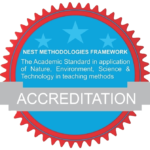Introduction:
In today’s interconnected world, it is crucial to equip individuals with the knowledge and skills to become responsible global citizens. Sustainable education, which focuses on addressing social, economic, and environmental challenges, plays a vital role in nurturing such citizens.

The NEST methodology developed by CCLP Worldwide (Center for Citizenship, Leadership, and People Management) is an innovative approach that effectively addresses the issue of sustainable education and global citizenship. In this blog post, we will explore the key principles of the NEST methodology and how it can contribute to creating a sustainable and inclusive future.
- NEST Methodology: An Overview:
NEST stands for Nature, Environment, Science, and Technology which promotes Nurturing Educational Sustainability through Teaching (NEST). It is an educational framework developed by CCLP Worldwide that integrates sustainable development principles into the teaching and learning process. The methodology aims to foster global citizenship, critical thinking, and active engagement among students, preparing them to contribute positively to society.

- Holistic Approach to Education:
The NEST methodology takes a holistic approach to education, emphasizing the interconnectedness of social, economic, and environmental issues. It encourages educators to integrate sustainability concepts across different subjects, promoting a comprehensive understanding of global challenges and their solutions. By weaving sustainability into the curriculum, students develop a broader perspective and the skills needed to tackle complex problems.
- Experiential Learning and Real-World Connections:
Central to the NEST methodology is the emphasis on experiential learning and real-world connections. It encourages educators to incorporate practical activities, field trips, and community projects into the curriculum, enabling students to apply their knowledge and skills in real-life situations. This hands-on approach fosters a deeper understanding of sustainable practices and nurtures a sense of responsibility towards the environment and society.
- Empowering Students as Change Agents:
NEST methodology empowers students to become change agents in their communities. It promotes student-led initiatives and encourages them to identify and address sustainability challenges within their schools and neighborhoods. By engaging in projects related to waste management, energy conservation, or social issues, students develop leadership skills, critical thinking abilities, and a sense of ownership in creating a sustainable future.

- Global Collaboration and Cultural Exchange:
Global citizenship is a fundamental aspect of the NEST methodology. It encourages collaboration among students from different countries, fostering cultural exchange and understanding. Through virtual classrooms, collaborative projects, and cultural exchanges, students learn to appreciate diversity, develop empathy, and work together towards common goals. This global perspective enhances their ability to navigate and contribute to an increasingly interconnected world.
- Teacher Professional Development:
To effectively implement the NEST methodology, teacher professional development is vital. CCLP Worldwide provides training programs and resources to support educators in integrating sustainability concepts into their teaching practices. These programs equip teachers with the knowledge, tools, and pedagogical approaches required to effectively engage students in sustainable education and global citizenship.

Conclusion:
The NEST methodology by CCLP Worldwide offers a powerful framework for addressing the pressing challenges of sustainable education and global citizenship. By adopting a holistic approach, emphasizing experiential learning, and empowering students as change agents, this methodology equips individuals with the knowledge, skills, and values necessary to create a sustainable and inclusive future. Through the NEST methodology, we can nurture a generation of responsible global citizens who are equipped to address the complex challenges of our time and contribute positively to society.

